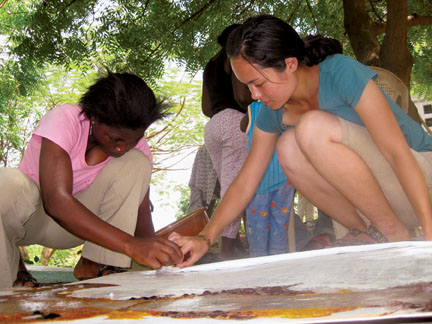Swarthmore in Ghana: Changing the Lives of Unemployed Women

Swarthmore has a special collaborative arrangement with the University of Ghana, which is strong in African Studies—especially music, dance, and the performing arts. Students may also intern with members of government agencies and NGOs, especially in economic development and related areas. Last year, Tamara de Moor ’10 (above, right) and Nii Yartley, a professor at the University of Ghana, designed a three-part, skills-training curriculum to empower Ghanain women “not only economically but personally and emotionally.”
Thanks to Tamara De Moor ’10, the lives of nine previously unskilled and unemployed Ghanaian women have been changed for the better—hopefully forever.
Last spring, De Moor, a Japanese and art history major, spent a semester studying at the University of Ghana. Besides courses in drumming, archaeology, and Twi (the most widely spoken language in the country), she undertook an independent study project to establish a pilot program empowering women to support themselves and their families. Supported by a Lang Opportunity Scholarship to fund her work with the women, she collaborated in situ on the project with Nii Yartey, a professor at the University of Ghana and Ashesi University and founder of Ghana’s Noyam African Dance Institute.
De Moor and Yartey co-designed a three-part, skills-training curriculum, recruiting local instructors, including a senior business student from Ashesi, to teach courses in community theater, to help the women build self-confidence and develop public-speaking skills; business administration; and traditional Ghanaian batik and tie-and-dye art. De Moor says, “It is significant that the textile and business instructors were female, serving as strong role models for the participants and demonstrating that success not be limited
by gender.”
After three months of intensive training, de Moor organized a day of festivities, during which the women debuted an inaugural collection of their designs with a community fashion show and gallery exhibit held at the Dance Institute. They performed two dances and an original play they had written on issues of sanitation and health in their community.

One of the projects taught traditional batik and tie-and-dye art. When the lessons were finished, the women celebrated with de Moor (left) by modeling their creations.
“Now, the women are putting their education into practice, as we assist them in forming a textile cooperative that will enable them to earn a living wage through the sale of batik and tie-dye creations,” De Moor says, adding that she and Professor Yartey plan to replicate the project, with the original nine women training others from similarly disadvantaged backgrounds to follow their example.
While in Ghana, De Moor established a relationship with Ashesi University, arranging for two Ashesi students to assume the coordination of the project upon de Moor’s return to Swarthmore. Depending upon the success of the project, De Moor and Awuah will discuss the possibility of including the program as a community service option within the Ashesi curriculum.
“As a result of their participation in this program, the women will be empowered not only economically but also personally and emotionally, as they gain recognition among community members as entrepreneurs and themselves as leaders of social change,” De Moor says.
“The experience was life-changing for me, too,” De Moor adds. “Any former fear of challenge or failure has been replaced by keen anticipation to face head on and with open arms any hurdle I encounter.”
 Email This Page
Email This Page